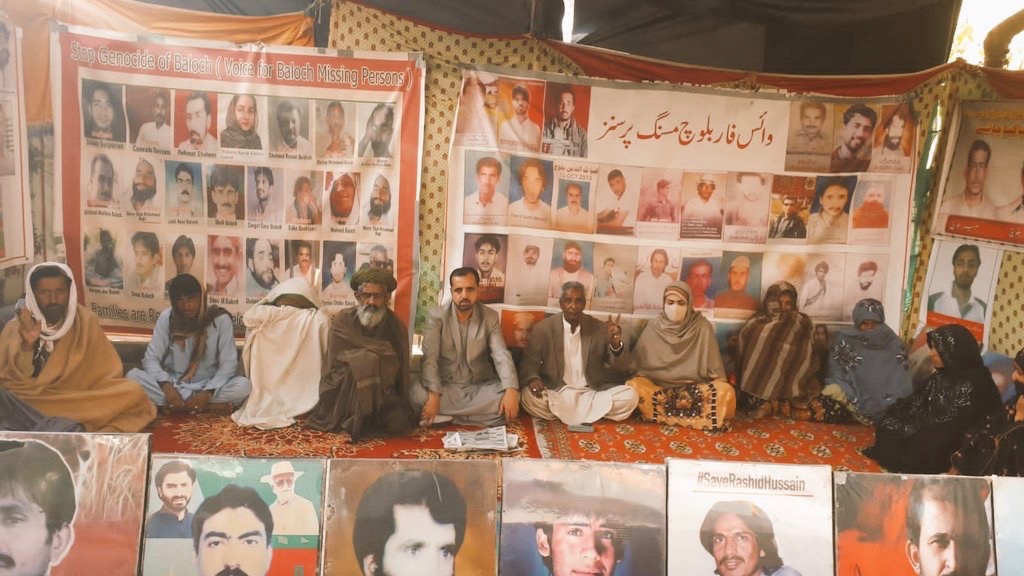In Pakistan, the 26-day protest march by the Baloch Yakjehti Committee along with Voice for Baloch Missing Persons culminated outside the Karachi Press Club on November 8. Protesting against the recent unconstitutional detention of women and minors in the Bolan district of Balochistan province, as well as repeated incidents of enforced disappearances of Baloch people, demonstrators called the region lying in southwestern Pakistan “a torment camp.”
A protest against enforced disappearances was held in front of the Karachi Press Club and the families of the missing persons participated and demanded the recovery of their loved ones.#ReleaseAbdulHameedZehri #ReleaseBalochMissingPersons pic.twitter.com/2NrmOHSyEK
— Saeeda Hameed (@saeeda_hameed) November 8, 2022
Baloch Yakjehti Committee (@YakjehtiKarachi) is holding a protest along with Voice For Baloch Missing Persons (@VBMP5) against the Enforced Dissapperance Of Baloch Students, Women and continuous operation in Bolan.#Karachi#Sindh pic.twitter.com/AnWO0XkQZS
— Mahnoor Haider | ماھنور ھیدر (@Mao_Baluch) November 8, 2022
Highlighting the perpetual trauma and atrocities experienced by the people of Balochistan, protesters chanted slogans such as, “Stop fake encounters of Baloch youngsters”, “Stop the army operation in Bolan”, “Yeh jo namaloom hai hum sab ko maloom hai – those who are unknown we know them.” Protesters also stressed that the silence of the international community is “escalating this violence,” saying, “Almi idaron ki khamoshi, sharman digi – the silence of the world bodies is shameful.”
At least 13 women and children were taken into custody in Bolan district last month. They were later released after widespread criticism by several political parties and rights defenders.
بولان سے فورسز کے ہاتھوں خواتین اور بچوں کی جبری گمشدگی کےخلاف وائس فار بلوچ مسنگ پرسنز کے زیرے اہتمام 8 نومبر بروز منگل 3 بجے کوئٹہ پریس کلب کے سامنے احتجاج کیا جائے گا۔#SaveBalochWemen pic.twitter.com/WS6M426UV7
— VBMP (@VBMP5) November 7, 2022
According to activist and president of Voice for Baloch Missing Persons, Mama Qadeer Baloch, in the past few weeks several people have been booked by the counter terrorism department under false charges. Qadeer has been raising the issue of enforced disappearances at different platforms, for which he has faced repeated threats and harassment from the authorities. His son Jalil Leki was also picked up, allegedly by officials of intelligence agencies, in November 2009.
People of Balochistan have faced years of state violence and structural intimidation, due to which many people have also committed suicide. At least three suicide cases emerged just this month among families who were continuously harassed by the state apparatus.
22-year-old Tabish Waseem, a member of Baloch Students Organization-Pajjar (BSO-Pajjar), was abducted by two unidentified men from a private hospital in southwest Pakistan’s Balochistan on June 9 last year. Waseem was killed last month in what many declared was a fake encounter in the Kharan district in Balochistan.
His father Muhmmad Shareef claimed that the abductors were personnel of the paramilitary force Frontier Corps, who forcibly took away his son. He alleged that his son was tortured and subsequently killed. “Then they say they were ‘terrorists’,” he told the Guardian.
The Commission of Inquiry on Enforced Disappearances noted that at least 415 new cases of enforced disappearances were recorded across Pakistan last year. This number was around 800 in 2019 and 1,098 in 2018. However, such figures on enforced disappearances are contested by activists who argue that the actual number is much higher.
Due to repeated incidents of youngsters disappearing after being picked up by unidentified persons, families have staged regular protests. According to Voice for Baloch Missing Persons, over 5,000 people in Balochistan are missing.
Amnesty International’s report Living Ghosts says, “disappearances are a tool of terror that strikes not just individuals and families, but entire societies. This is why enforced disappearances are a crime under international law and, if committed as part of a systematic attack against a civilian population, they constitute a crime against humanity.”
“We spent more than 50 days and nights under rain and scorching heat so that the security agencies would stop the unconstitutional activity of abducting people and killing them in fake encounters. The ministers promised us that they will resolve the issue and they won’t let more people be killed,” said Sammi Deen Baloch, general secretary of Voice for Baloch Missing Persons and the daughter of missing Dr Deen Mohammad.





